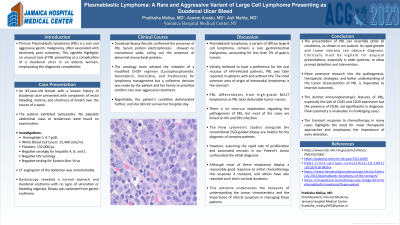Tuesday Poster Session
Category: Stomach
P4188 - Plasmablastic Lymphoma: A Rare and Aggressive Variant of Large Cell Lymphoma Presenting as Duodenal Ulcer Bleed
Tuesday, October 24, 2023
10:30 AM - 4:00 PM PT
Location: Exhibit Hall

Has Audio

Pratiksha Moliya, MD
Jamaica Hospital Medical Center
Edison, NJ
Presenting Author(s)
Pratiksha Moliya, MD1, Azeem Arastu, MD2, Asit Mehta, MD2
1Jamaica Hospital Medical Center, Edison, NJ; 2Jamaica Hospital Medical Center, New York, NY
Introduction: Primary Plasmablastic lymphoma account for less than 2% of gastric malignancy. These tumors are notoriously extremely aggressive with poor prognosis despite intensive chemotherapy.
Case Description/Methods: An 83-year-old woman with a history of duodenal ulcer presented with rectal bleeding, black stool, and shortness of breath for a week. She denied a history of HIV infection, immunosuppression, or steroid use. She was tachycardic. Examination revealed no palpable mass. Initial laboratory data showed the following: Hb of 4.7 g/dL; WBC of 15,400 cells/mL; and platelet of 132,000/µL. The hepatitis A, B, and C serology and EBV testing resulted negative. A CT angiogram of the abdomen was unremarkable. The Patient underwent a gastroscopy, which showed a normal stomach with duodenal erythema without any ulcer or bleeding stigmata. The duodenal biopsy proved Plasmablastic lymphoma. The serum protein electrophoresis (SPEP) revealed no monoclonal spike. The Oncologist recommended a modified CHOP regime, but considering the rapidly deteriorating condition, the family and Patient opted for comfort care. Unfortunately Patient did not survive the hospitalization.
Discussion: PBL is a variant of large cell lymphoma with distinct immunophenotypic features. Initially believed to have a preference for the oral mucosa of HIV-infected patients, PBL was later reported in patients with and without HIV. The most common area of origin of extranodal lymphomas is the stomach. PBL differentiates from high-grade MALT lymphomas as PBL lacks detectable tumor masses. There is no clear-cut explanation regarding the pathogenesis of PBL, but most of the cases are linked to HIV and EBV infection. The Flow cytometric studies alongside the conventional EGD-guided biopsy are helpful for the diagnosis of complex patients. However, assuming the rapid rate of proliferation and associated necrosis in our Patient's tumor confounded the initial diagnosis. Although most of these neoplasms display a reasonably good response to initial chemotherapy, this response is transient, and others have also reported such short survival durations. This outcome underscores the necessity of understanding the tumor characteristics and the importance of clinical suspicion in managing these patients.
Disclosures:
Pratiksha Moliya, MD1, Azeem Arastu, MD2, Asit Mehta, MD2. P4188 - Plasmablastic Lymphoma: A Rare and Aggressive Variant of Large Cell Lymphoma Presenting as Duodenal Ulcer Bleed, ACG 2023 Annual Scientific Meeting Abstracts. Vancouver, BC, Canada: American College of Gastroenterology.
1Jamaica Hospital Medical Center, Edison, NJ; 2Jamaica Hospital Medical Center, New York, NY
Introduction: Primary Plasmablastic lymphoma account for less than 2% of gastric malignancy. These tumors are notoriously extremely aggressive with poor prognosis despite intensive chemotherapy.
Case Description/Methods: An 83-year-old woman with a history of duodenal ulcer presented with rectal bleeding, black stool, and shortness of breath for a week. She denied a history of HIV infection, immunosuppression, or steroid use. She was tachycardic. Examination revealed no palpable mass. Initial laboratory data showed the following: Hb of 4.7 g/dL; WBC of 15,400 cells/mL; and platelet of 132,000/µL. The hepatitis A, B, and C serology and EBV testing resulted negative. A CT angiogram of the abdomen was unremarkable. The Patient underwent a gastroscopy, which showed a normal stomach with duodenal erythema without any ulcer or bleeding stigmata. The duodenal biopsy proved Plasmablastic lymphoma. The serum protein electrophoresis (SPEP) revealed no monoclonal spike. The Oncologist recommended a modified CHOP regime, but considering the rapidly deteriorating condition, the family and Patient opted for comfort care. Unfortunately Patient did not survive the hospitalization.
Discussion: PBL is a variant of large cell lymphoma with distinct immunophenotypic features. Initially believed to have a preference for the oral mucosa of HIV-infected patients, PBL was later reported in patients with and without HIV. The most common area of origin of extranodal lymphomas is the stomach. PBL differentiates from high-grade MALT lymphomas as PBL lacks detectable tumor masses. There is no clear-cut explanation regarding the pathogenesis of PBL, but most of the cases are linked to HIV and EBV infection. The Flow cytometric studies alongside the conventional EGD-guided biopsy are helpful for the diagnosis of complex patients. However, assuming the rapid rate of proliferation and associated necrosis in our Patient's tumor confounded the initial diagnosis. Although most of these neoplasms display a reasonably good response to initial chemotherapy, this response is transient, and others have also reported such short survival durations. This outcome underscores the necessity of understanding the tumor characteristics and the importance of clinical suspicion in managing these patients.
Disclosures:
Pratiksha Moliya indicated no relevant financial relationships.
Azeem Arastu indicated no relevant financial relationships.
Asit Mehta indicated no relevant financial relationships.
Pratiksha Moliya, MD1, Azeem Arastu, MD2, Asit Mehta, MD2. P4188 - Plasmablastic Lymphoma: A Rare and Aggressive Variant of Large Cell Lymphoma Presenting as Duodenal Ulcer Bleed, ACG 2023 Annual Scientific Meeting Abstracts. Vancouver, BC, Canada: American College of Gastroenterology.
